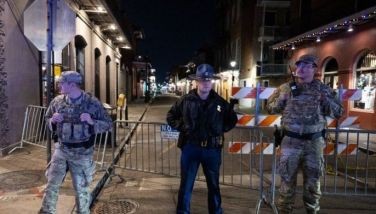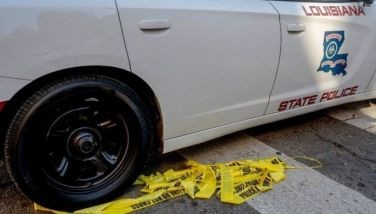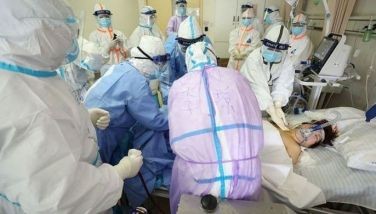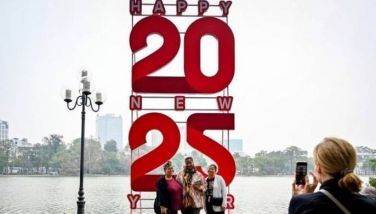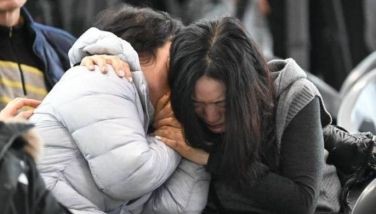No jury for first Hong Kong 'national security' trial as columnist arrested
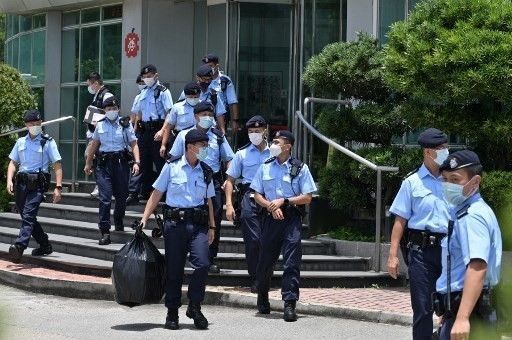
HONG KONG, China — The first trial under Hong Kong's new national security law began on Wednesday without a jury, a watershed moment for the financial hub's fast-changing legal landscape.
The opening of the closely-watched court case came as police also arrested a senior columnist from the pro-democracy newspaper Apple Daily under the same law.
China's authoritarian leaders have used the law to stamp out dissent in Hong Kong after the city was convulsed by huge and often violent democracy protests in 2019.
Prosecutors started presenting their case against Tong Ying-kit, 24, who was arrested the day after the security law came into effect.
He allegedly drove his motorcycle into a group of police officers during protests on July 1 last year.
Footage showed his motorcycle was flying a flag that read "Liberate Hong Kong, revolution of our times", a popular pro-democracy protest slogan that is now deemed illegal under the security law.
Tong faces charges of inciting secession and terrorism, as well as a charge of dangerous driving and has pleaded not guilty.
"Liberate Hong Kong, revolution of our times" was little used until huge and often violent democracy protests convulsed Hong Kong for months in 2019 where it became the dominant rallying cry.
For some, it meant advocating for full independence. But for many others, it was a broader call for democracy or greater autonomy as well as a cry of frustration at Beijing's rule.
Trial by judges
Tong's trial, which western diplomats are attending, is a key legal test for whether the slogan is now illegal.
As they opened their case, prosecutor Anthony Chau said his team would show the phrase meant separating Hong Kong from China, or seeking "regime change".
Chau added that the terrorism charge was justified because Tong was trying to coerce the government "to pursue a political agenda".
Two courts rejected Tong's plea to have his case heard by a jury, which his legal team had argued was a constitutional right given that he faces a life sentence if convicted.
Trial by jury has been a cornerstone of Hong Kong's 176-year-old common law system and is described by the city's judiciary on its website as one of the legal system's "most important features".
But the national security law allows for cases to be tried by three specially selected judges.
The city's justice secretary invoked the no-jury clause for Tong's trial arguing that juror safety could be compromised in Hong Kong's febrile political landscape.
The wording of Beijing's security law makes clear that it trumps any local regulations in the event of a dispute, something successive court rulings have already upheld.
Tong's case is unusual because he is the only Hong Konger so far charged under the security law with an explicitly violent act.
More than 60 people have now been charged under the law, including some of the city's best-known democracy activists, but their offences are related to political views or speech that authorities have declared illegal.
Columnist arrested
The most recent arrest on Wednesday was the lead editorial writer for Apple Daily.
The outspoken tabloid has long been a thorn in Beijing's side, with unapologetic support for the city's pro-democracy movement and caustic criticism of China's authoritarian leaders.
Yeung Ching-kee -- who writes under the pen name Li Ping -- was detained on suspicion of colluding with foreign forces to endanger national security.
Two of the paper's executives were charged last weekend with the same crime in an operation police said was sparked by articles that allegedly supported international sanctions against China.
Authorities also used the security law to freeze Apple Daily's assets. The paper has warned it will go out of business in a matter of days if it cannot get those funds unfrozen.
Hong Kong and Chinese authorities have hailed the security law for successfully restoring stability after the 2019 demonstrations.
But it has radically transformed the political and legal landscape of a city authoritarian China promised would be able to keep key liberties and autonomy after its 1997 return.
A host of political views have been criminalised by the law.
China has jurisdiction over some cases and allowed its mainland security agents to operate openly in Hong Kong for the first time.
As well as the no-jury provision, the law has removed the presumption of bail for non-violent crimes.
Those charged have to instead prove to judges they will no longer pose any sort of national security threat. The vast majority of those charged are held in custody until trial.
- Latest
- Trending
















